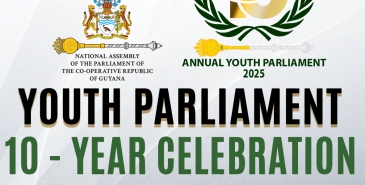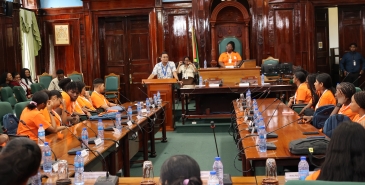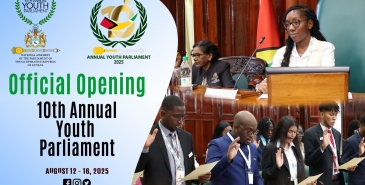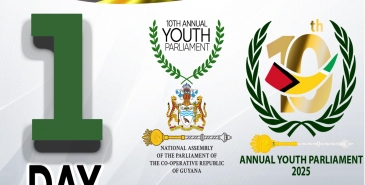Public Records Are the Nation’s Assets
Speech delivered at: 20th Sitting - Tenth Parliament - 10 May, 2012
10 May, 2012
6715
Ms. Ally: I wish to support my colleague on the motion, “Hansard for the period January, 1985 to December, 1992”.
I want to join in signalling the importance of having all records of the National Assembly, more so the Hansard, available in the National Assembly. Sir, it boggles my mind why these very importance documents are not available for the period 1985 to 1992. More recently, a few minutes ago, I am told that some of them have been found, from the year 1998. But, be that as it may, I wonder, Sir, why would anyone not want to have those Hansard for an important era in the history of our country? As you know, Sir, this was the very period in which the records pertaining to debates on the Economic Recovery Programme had taken place - that very important programme which laid the basis for the improvement in our economy. It is even more incomprehensible that those records are missing for the year when the PPP/C assumed office in Government. This, Sir, does not smell refreshing.
The Hansard is treated as an accurate report. As I understand it, the edited Hansard is the official verbatim report of the legislature. In the case of any dispute, the Hansard is taken as the official record, and there were, recently, several instances where the Hon. Speaker had to call for the verbatim records of Members. It must be noted that the electronic version of the Hansard is printed only for information purpose, but the printed Hansard is the document of record.
Reporting is mandatory. Our parliamentary records are sacred. They are our sole reference of the business of this legislative aspect of governance. Hence, they must be treated with some measure of safety and importance, so that at any time in our lives they can be used as historical references.
Modern technology today affords us the luxury of having Hansard in a very timely fashion. I have been long enough in the National Assembly to recall the laborious task of reporters reporting and recording all of the business of National Assembly, then having to edit them and subsequently to produce them.
I must place on record that this very period, with the missing Hansard, was my first period of tour of duty in this Parliament, and, for me, it is very disgusting that I cannot look back at those interesting years when I first served as a Member in this august body.
The production of Hansard has come a long way. Records of parliamentary business began since in the 1800s and has gone through various stages, on reporting on extracts, from shorthand writers to be transcribed in notes form, type from those symbolic typist machines, cyclostyled from those duplicating machines, from tape recorders to now, where these verbatim records compiled and recorded using modern technology.
The production of Hansard requires people with highly specialised knowledge. It is an intensive job carried out under great pressure, completed within a fixed time frame, continued for long hours without a break, utmost concentration, intellectual effort, needless to say, the physical stamina, mental alertness and quick reflexes are the essential attributes necessary for the production of Hansard. As I speak, Sir, I recall Ms. Eileen Cox, who used to sit way across there, and I was sitting where my honourable friend Keith Scott is sitting, that quiet and unassuming person who exhibited many of those attributes I spoken of, a short while ago, but, unfortunately is denied pension because of lost records at this very office. [Mr. Neendkumar: It is not you who carried it away.] I am not like you, Mr. Neendkumar, you always get yourself involved in those kinds of acts. How could all that pain and sacrifice be endured and today we are told that those Hansard cannot be found.
From the 1800s to present the production of Hansard has came a long way. We acknowledge the stages of development and these must be preserved, whether it is our likes or our dislikes. Sir, as you see, it is not only a report but those copies of Hansard are a rich source of contemporary history. They provide detail information on all matters touching the life of a citizen. They bring to light the political, economic and social conditions of even the remotest parts of the country, besides, they serve as a mirror of hopes and aspirations, concerns and apprehensions of the nation as voiced by its chosen representatives. We cannot allow the voices of our country’s representatives in the National Assembly to disappear in thin air.
I, therefore, want to urge that that there must be expedient effort to find and to submit those reports to this National Assembly. I want to further urge that if those documents really cannot be found - if they were destroyed to fulfil anyone’s promises - that Sir, you launch an inquiry into the said disappearance or destruction and report the findings to the National Assembly.
A Partnership For National Unity (APNU) cannot accept this distasteful situation, hence, I urge that every stock be pulled out to retrieve these very important records.
I thank you. [Applause]
Speech delivered by:
What's New

17 August, 2025
10th Annual Youth Parliament Closes: Celebrating a Decade of Impact, Excellence, and Youth Empowerment10th Annual Youth Parliament Closes: Celebrating a Decade of Impact, Excellence, and Youth Empower

13 August, 2025
Youth Parliamentarians Assemble for Grand Rehearsals for the 10th Annual Youth Parliament

12 August, 2025
10th Annual Youth Parliament Kicks Off – Young Voices, Bold Ideas, Bright Futures!

11 August, 2025
10th Annual Parliament Kicks off tomorrow

